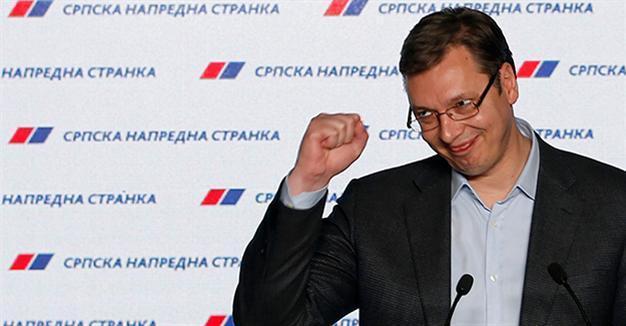Serbian voters resoundingly endorse leader’s pro-EU policies
BELGRADE – Reuters

Serbian Prime Minister and Progressive Party leader Aleksandar Vucic, reacts during a press conference after claiming victory in parliamentary elections in Belgrade, Serbia, Sunday, April 24, 2016 - AP photo
Serbia’s pro-western Prime Minister Aleksandar Vucic won a resounding endorsement in the April 24 general election for his policy of pursuing European Union membership, securing four more years in power with a parliamentary majority.
But he will have to contend with a resurgent ultra-nationalist opposition which rejects integration with the EU and demands closer ties with Russia.
Vucic went to the polls two years early, saying he wanted a clear mandate from Serbia’s 6.7 million voters for reforms to keep EU membership talks launched in December 2015 on track for completion by 2019.
Even though Vucic presided over a period of austerity, partly forced on him by the terms of a 1.2 billion euro ($1.35 billion) loan agreement with the International Monetary Fund (IMF), voters again strongly backed the 46-year-old, himself a former hardline nationalist.
His conservative Progressive Party was set to win just around 50 percent of the vote, up from 48 percent two years ago, a projection by pollsters Cesid, the Centre for Free Elections and Democracy, said.
“This is an historic result, getting more votes in absolute numbers and in percentages than two years ago when we started difficult reforms,” Vucic said.
“Today’s result strongly supports our democracy, diplomatic efforts and European integration,” he said.
Vucic must now decide whether he will rule alone or seek to broaden his support further by continuing to govern in coalition with the Socialists, who came second with around 11.6 percent of the vote, or another party.
The election marked resurgence by the ultra-nationalist Radical Party of Vojislav Seselj, acquitted by the U.N. tribunal in The Hague last month of war crimes during the 1990s breakup of Yugoslavia.
The Radicals were set to win around 7.8 percent of the vote, turning them into the third-biggest party in parliament after a four-year absence from the assembly.
They could turn into a thorn in Vucic’s side, resisting his pro-EU policies and calling instead for an alliance with Russia.
Seselj voiced disappointment with the result but said “in future debates we will show we are superior to our opponents.”
The pro-EU Democratic Party, which won around 6 percent of the vote, complained of scattered irregularities that favored the Progressive Party, saying some voters had been given ballots that were already filled in.
Exactly how many seats in the 250-member parliament the Progressives end up with depends on how many other parties exceed the five percent threshold needed to get into the assembly.
Three parties are hovering around the five percent threshold, according to Cesid. If they all get into parliament, it would reduce the Progressives’ majority.
But analysts said the Progressives were still likely to get an absolute majority of between 137 and 156 seats, compared with 158 in the old parliament.
The EU Commissioner in charge of relations with would-be member states, Johannes Hahn, said on Twitter he was confident Vucic “will use citizens’ strong support in a responsible way and that it [the election] will strengthen Serbia’s EU perspective.”
